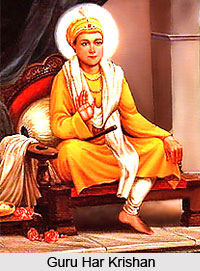 Guru Har Krishan, the eighth guru of the Sikhs, succeeded his father Guru Har Rai on 7th October 1661. Har Krishan was made the Sikh guru by his father only at the age of five. Har Krishan was born to Guru Har Rai and Kishan Kaur or Mata Sulakani in Rupnagar, Punjab on 7th of July, 1656. Guru Har Rai had made his younger son, Har Krishan as the next Sikh guru instead of his elder son Ram Rai because Ram Rai was closely involved with the Mughal emperors.
Guru Har Krishan, the eighth guru of the Sikhs, succeeded his father Guru Har Rai on 7th October 1661. Har Krishan was made the Sikh guru by his father only at the age of five. Har Krishan was born to Guru Har Rai and Kishan Kaur or Mata Sulakani in Rupnagar, Punjab on 7th of July, 1656. Guru Har Rai had made his younger son, Har Krishan as the next Sikh guru instead of his elder son Ram Rai because Ram Rai was closely involved with the Mughal emperors.
Legend says that Ram Rai complained to Mughal Emperor Aurangzeb that he had been denied his legitimate right by his father, Guru Har Rai, because he had been faithful to the Mughal rulers. Ram Rai knew that his father had forbid Har Krishan from meeting with the Mughal Emperor and if Har Krishan would meet the Mughal ruler the Sikhs would go against him. On the other hand if he did not meet Aurangzeb the Emperor would force him to do so. Thus Ram Rai wanted to put his brother into trouble. As Aurangzeb was very friendly with Ram Rai he soon summoned Har Krishan to Delhi. The Sikh community did not want Har Krishan to go to Delhi to meet the Emperor. As a result, Aurangzeb sent Raja Jai Singh who was well known for his devotion towards the Sikh gurus to escort Guru Har Krishan to Delhi.
Finally, Guru Har Krishan set for Delhi along with his mother and a number of devotees. On his way he showed his miraculous power when he was taunted by a Brahman. On reaching Delhi the guru and his party were the guests of Raja Jai Singh. During his stay in Delhi large number of devotees crowded to see the guru and listen to his teachings. At this time Delhi was periled with an epidemic of small pox and the young guru went forward to help the sick. He healed many of the affected and in the process the guru himself got affected with the disease and became seriously ill.
Guru Har Krishan declared his successor on March 30th, 1964. It is said that he asked for five coins and a coconut and then he waved his hand three times in the air and called out, “Baba Balakaâ€. Baba Balaka was the grand uncle of Guru Har Krishan, Guru Teg Bahadur. Thus, Guru Teg Bahadur was nominated as the ninth guru of the Sikhs. Shortly after declaring his successor, Guru Har Krishan expired at an age of eight.




















